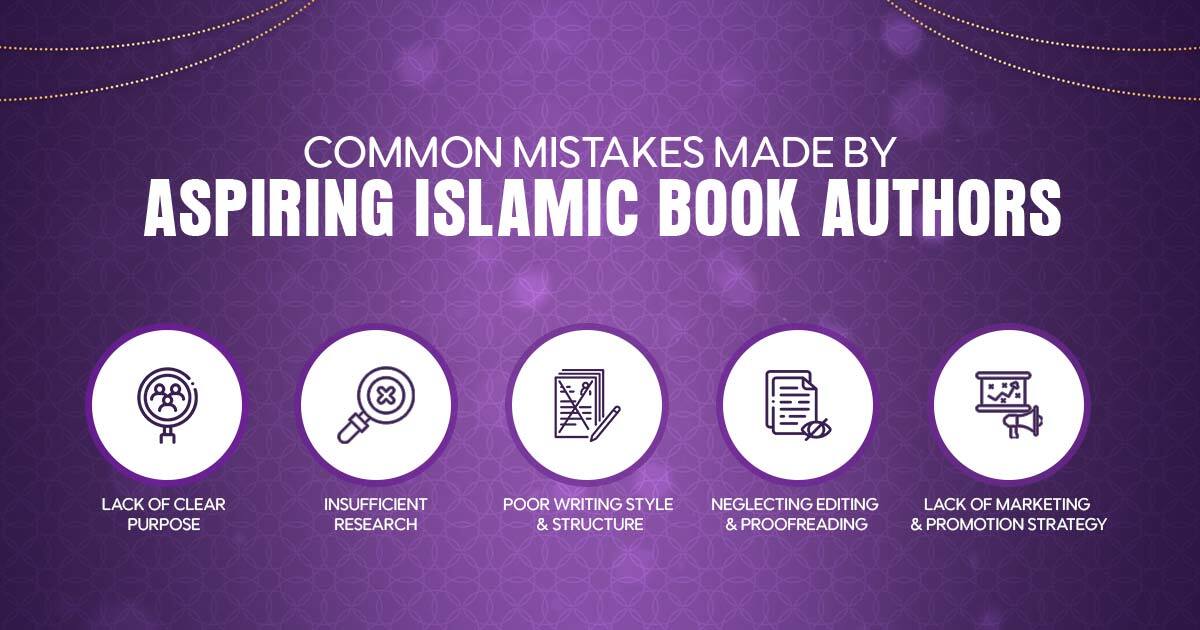In the realm of Islamic literature, aspiring authors often embark on a journey to share their knowledge, insights, and spiritual experiences through books. However, this path is not without its challenges. Many authors, especially those new to the field, make common mistakes that can hinder the effectiveness and impact of their work. In this comprehensive guide, we will explore these mistakes and provide valuable insights on how to avoid them.
Writing an Islamic book is a noble endeavor that requires dedication, knowledge, and a deep understanding of both the subject matter and the audience. Aspiring authors must navigate various aspects of the writing process, from conceptualization to publication, while avoiding pitfalls that can detract from the quality and reception of their work.
Mistake 1: Lack of Clear Purpose and Audience Identification
One of the most fundamental mistakes aspiring Islamic book authors make is not defining a clear purpose for their book and identifying their target audience. Without a clear understanding of why they are writing and who they are writing for, authors may struggle to communicate their message effectively.
How to Avoid This Mistake:
- Define the purpose of your book: Are you aiming to educate, inspire, or provide guidance?
- Identify your target audience: Who will benefit most from your book? Muslims seeking spiritual growth, new converts, scholars, etc.
Mistake 2: Insufficient Research and Understanding of Islamic Principles
Another common mistake is writing without thorough research and a deep understanding of Islamic principles. Inaccuracies, misinterpretations, or lack of depth can undermine the credibility and impact of the book.
How to Avoid This Mistake:
- Conduct extensive research: Consult authentic sources, scholars, and reputable Islamic literature.
- Seek understanding: Delve deeply into the topics you intend to cover, ensuring accuracy and adherence to Islamic teachings.
Mistake 3: Poor Writing Style and Structure
Effective communication is essential in writing, and a poor writing style or disorganized structure can hinder reader engagement and comprehension. Aspiring authors must pay attention to clarity, coherence, and flow in their writing.
How to Avoid This Mistake:
- Develop a clear writing style: Use simple language, avoid jargon, and strive for clarity and precision.
- Organize your content: Use headings, subheadings, and bullet points to structure your book logically and facilitate easy navigation for readers.
Mistake 4: Neglecting Editing and Proofreading
Rushing to publish without proper editing and proofreading is a common mistake that can result in grammatical errors, typos, and inconsistencies in the text. These issues can detract from the professionalism and credibility of the book.
How to Avoid This Mistake:
- Take time to edit: Review your manuscript multiple times for grammar, spelling, and coherence.
- Get feedback: Seek feedback from beta readers, editors, or fellow authors to catch overlooked errors and improve the overall quality of your book.
Mistake 5: Lack of Marketing and Promotion Strategy
Even a well-written book may struggle to reach its intended audience without a solid marketing and promotion strategy. Neglecting this aspect can limit the book’s visibility and impact.
How to Avoid This Mistake:
- Develop a marketing plan: Identify target readership, channels for promotion (social media, book fairs, online platforms), and promotional materials (book trailers, author interviews, etc.).
- Engage with your audience: Build an online presence, interact with readers, and seek opportunities for book signings, lectures, or workshops related to your book’s theme.
Conclusion:
By avoiding these common mistakes and following best practices in writing, researching, editing, marketing, and engaging with readers, aspiring Islamic book authors can enhance the quality and impact of their work. Remember that writing is a continuous learning journey, and each book is an opportunity to grow, inspire, and contribute positively to the Islamic literary landscape.
FAQs About Common Mistakes Made by Aspiring Islamic Book Authors:
What are some common misconceptions about writing Islamic books?
Common misconceptions include thinking that writing in a complex or archaic style is more impressive, neglecting the importance of research and authenticity, and underestimating the role of marketing and promotion.
How can I ensure that my Islamic book is authentic and adheres to Islamic principles?
Ensure authenticity by consulting reputable sources, scholars, and experts in the field. Double-check your interpretations and references to Islamic teachings to avoid misrepresentations.
What role does feedback play in improving the quality of an Islamic book?
Feedback from beta readers, editors, and peers is invaluable for identifying areas of improvement, clarifying misunderstandings, and ensuring that your book resonates with its intended audience.
Is self-publishing a viable option for aspiring Islamic book authors?
Yes, self-publishing can be a viable option, especially with the rise of digital platforms and print-on-demand services. However, authors should still prioritize quality in editing, design, and marketing to maximize the impact of their self-published work.
How can aspiring authors stay motivated throughout the writing process?
Stay motivated by setting realistic goals, seeking inspiration from Islamic teachings and role models, joining writing communities or workshops, and reminding yourself of the positive impact your book can have on readers.
